Graham Reid | | 8 min read
So Like Candy (demo w Elvis Costello)

The Eighties was a tough decade for many artists who'd made their name in the Seventies, and more especially those holdovers from the Sixties.
Dylan was adrift, and while the Stones started the decade with hit albums they suffered diminishing artistic and commercial returns . . . then Jagger started a solo career to Keith Richard's chagrin.
The Who called it a day mid-Eighties after the death of drummer Keith Moon, Clapton took most of the Eighties to regain his prior form, Led Zeppelin broke up after the demise of their drummer John Bonham (Jeez, drummers huh?), bands like Deep Purple suffered debilitating line-up changes, psychedelic-political Jefferson Airplane transitioned into the execrable MOR Jefferson Starship . . .
And the solo Beatles . . .
Lennon didn't even make it to the end of '80, Harrison became an increasingly marginal figure after his first post-Beatles flourish, and Starr just hung out and let his music career – which had initially been surprising successful with hit singles in the early Seventies – go on the back-burner.
And McCartney?
After his band post-Beatles band Wings found their straps and peaked in the mid Seventies, their career wound to close.
He entered the Eighties as a solo artist with some fair-to-middling albums, the time-wasting film/soundtrack Give My Regards to Broad Street (which against the odds went to number one in the UK) and it seemed he was destined to become an MOR performer with a great past and the possibility of the occasional hit single, but his albums only bought by loyalists.
And then right at the end of the decade he made a remarkable comeback.
Of sorts.
In '87 he recorded an album of invigorated rock'n'roll covers for the Russian market (and subsequently released internationally as CHOBA B CCCP/Back in the USSR) then got his act together for the album Flowers in the Dirt released in '89.
Perhaps he realised that after the poor commercial showings of previous solo albums he needed to up his game to be taken as a Serious Artist once more.
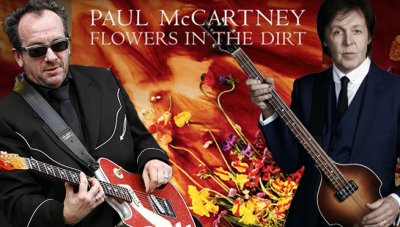 “I'm a competitor,” he
said at the time.
“I'm a competitor,” he
said at the time.
And in teaming up with fellow songwriter and former Liverpudlian Elvis Costello, he found a collaborator who would push and challenge him.
Together McCartney and Costello (the latter under his own name Declan MacManus) wrote around a dozen songs, four of which would appear on Flowers in the Dirt: Among them the modest hit My Brave Face and their emotional duel on You Want Her Too where Costello adds an apposite vocal part.
Other songs from their collaboration appeared on Costello's subsequent albums: Veronica and Pads Paws and Claws on Spike of '89, So Like Candy and Playboy to a Man on Mighty Like a Rose in '91 and so on.
It was a productive and provocative relationship for McCartney and doubtless forced his hand in his own writing, because Flowers in the Dirt was his strongest solo album of the decade.
Of sorts.
“I really took more care with the songs than anything,” he would say, “I wanted an album I could go on tour with, an album people could relate to.”
That did, and didn't, happen.
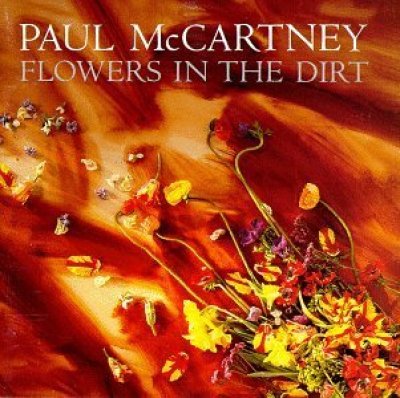 He was rewarded for his
labours – Flowers in the Dirt took 18 months – with a number one
in Britain. Although just for a week.
He was rewarded for his
labours – Flowers in the Dirt took 18 months – with a number one
in Britain. Although just for a week.
But perhaps more important for him at this point in his faltering career, he had critical respect again when the album was better received by reviewers than the public:
In a sense both parties – the pundits and the paying punters – were right about Flowers in the Dirt.
The sole collaboration with Costello which features Elvis on vocals, You Want Her Too, is a more snarky treatment of the same theme he explored in a lighter more pop vein with Michael Jackson on The Girl is Mine, Costello in especially fine, sneering form as the bitter Lennon-like foil to McCartney's more conciliatory tone.
McCartney noted: “I'm saying, 'I loved her so long' and he's saying, 'I know you did you stupid git'. I said, 'My God, that's me and John's whole style. I'd write some romantic line and John does some sort of acid acerbic put down.”
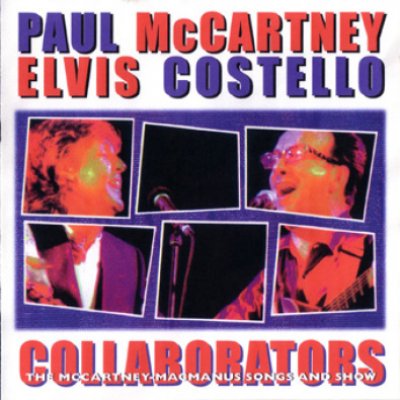 One of the other
McCartney-MacManus collaborations is My Brave Face which opens the
album and is a memorable and driving Beatlesque/Macca mid-paced
rocker which might not have sounded out of place between Rubber Soul
and Revolver (“I've been hitting the town and it didn't hit back”).
One of the other
McCartney-MacManus collaborations is My Brave Face which opens the
album and is a memorable and driving Beatlesque/Macca mid-paced
rocker which might not have sounded out of place between Rubber Soul
and Revolver (“I've been hitting the town and it didn't hit back”).
There's also the dub-influenced funk of Rough Ride and the string enhanced low-lights ballad Distractions which might be pulled back by its sentimental lyrics but, as with Waterfalls on McCartney II at the start of the decade, boasts a lovely melody.
On the simple Put It There he bridges the generations with much less distance and acrimony than Cat Stevens did on Father and Son, and This One is one of his most sincere songs lost in the need to over-produce and conform to the idioms of Eighties pop.
But then there are also the typical McCartney make-weight songs: The forgettable Figure of Eight which, like so many McCartney songs in that lost decade attempt to replace production and passion with depth; the utterly anonymous Don't Be Careless Love and That Day is Done which are stacked towards the end of the album.
It is almost like he gave up and reverted to type after the rude but important Costello intrusion in the opening overs.
Yet those latter two were co-writes with Elvis but, as Macca critic and biographer Geoffrey Giuliano writes in Blackbird; The Unauthorised Biography of Paul McCartney, “Flowers in the Dirt is about a fifty-fifty proposition. That is, half the tunes work admirably while the other half slog by weighed down by their own overblown sense of self”.
He's referring to nonsense like the dull and over-produced reggae rubbish of How Many People (“never get the chance to shine/go for a ride/never make it through to the other side”) which is – sadly given its lack of depth – about the Brazilian eco-activist Chico Mendes who had been murdered the previous year.
Flowers in the Dirt is an album which begins promisingly but in places it sounds like his nerve failed him and he just did what he knew he could.
Does anyone remember Motor of Love – McCartney touched by the hand of God with “I can't get over your motor of love, Heavenly father look down from above” – which takes out the final six and half minutes of this album?
So, a game of two halves? It's better than Giuliano's assessment actually: The pundits are 75 percent right; the paying punters (25 percent of this) are both right.
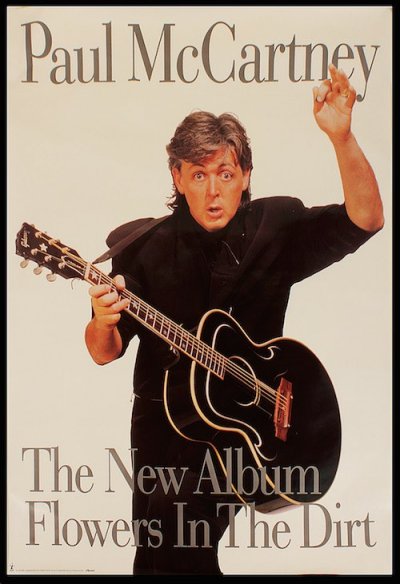 Yet despite some of the
album's low-key charms, these were superstar sessions: Among the many
players were Pink Floyd's David Gilmour, drummer Dave Mattacks (of
Fairport Convention and later sessions with Brian Eno), Stones piano
man Nicky Hopkins, Trevor Horn, saxophonist Chris White (from Dire
Straits' touring band) and many, many more.
Yet despite some of the
album's low-key charms, these were superstar sessions: Among the many
players were Pink Floyd's David Gilmour, drummer Dave Mattacks (of
Fairport Convention and later sessions with Brian Eno), Stones piano
man Nicky Hopkins, Trevor Horn, saxophonist Chris White (from Dire
Straits' touring band) and many, many more.
But that brief chart-topping in Britain (and Norway) plus a decent showing in a couple of European territories and Japan, the critics couldn't persuade people to buy it.
“It might have done better,” he told journalist Paul Du Noyer the following year and considering it in the context of his own Beatles/Wings legacy. “But if I hadn't so much to live up to I would have said it did brilliant. It's [sold] three and half million or something? For most people that would be a pretty big seller.
“I dunno, there was a lot of approval. The consensus seems to be that it was a good album.
“Overall I'm a bit disappointed [by the sales] but it certainly didn't put me off my food.”
And obviously, it did not.
Sir Paul still walks amongst, sometimes making new albums which few listen to (pity, albums like Chaos and Creation in the Backyard, his covers album Kisses on the Bottom and the recent New are not bad at all) and stomps the planet with a rocking band playing songs by his previous bands – the Beatles and Wings, lest we forget.
But a chance to reconsider Flowers in the Dirt arrives with the expanded the Paul McCartney Archive Collection which arrives as double CD and double album versions and an even more elaborate three CD/DVD box with a 112 page book, photos, handwritten lyrics and such.
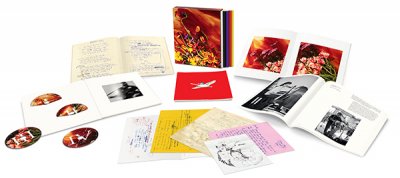 The massive box may just
be for collectors but the double CD version is interesting because it
adds in the catchy and funky Ou Est Le Soleil? (which was an extra
track on the '89 CD release and comes in remix versions in the box)
plus nine demos with Costello which are also in the box along with other
downloadable tracks.
The massive box may just
be for collectors but the double CD version is interesting because it
adds in the catchy and funky Ou Est Le Soleil? (which was an extra
track on the '89 CD release and comes in remix versions in the box)
plus nine demos with Costello which are also in the box along with other
downloadable tracks.
“The demos are red hot off the skillet,” he says, “and that’s why we wanted to include them on this boxed set. What’s great about these songs is that they’ve just been written. So there’s nothing more hot off the skillet as I say.
“So that was the kind of great instant thing about them. I hadn’t listened to them in ages but when I did I knew we had to put them out. We made a little tape of them and sent them to Elvis, who loved them too. We said we should put out an EP or something and now the moment’s finally arrived.”
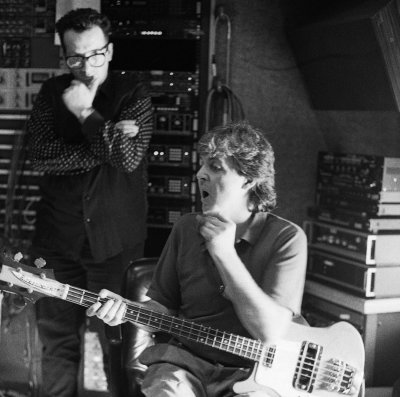 The demos find McCartney
is a more raw style, as if having Costello at his side was pushing
him. And the sparks of magic between them is palpable on The Lovers
That Never Were; the acoustic death song Tommy's Coming Home; a more muted and effective performance by Costello on You Want Her Too; the bitter-wseet So Like Candy . . .
The demos find McCartney
is a more raw style, as if having Costello at his side was pushing
him. And the sparks of magic between them is palpable on The Lovers
That Never Were; the acoustic death song Tommy's Coming Home; a more muted and effective performance by Costello on You Want Her Too; the bitter-wseet So Like Candy . . .
There's a lot of death, disappoinment and darkness in these collaborations too.
Some of these have the loose energy and engagement of Let It Be outtakes . . . only for some to lose that when McCartney (and to a lesser extent Costello) took these into the studio to polish them up for proper release.
It's a pity Flying to My Home (the rocking B-side to the My Brave Face single) isn't on the double CD edition of Flowers in the Dirt – it is among the many in the box of course -- but the demos plus the excellent songs on the original album make for a satisfying reappraisal of the album that allowed Paul McCartney to regain the attention of critics and take some of these songs on tour.
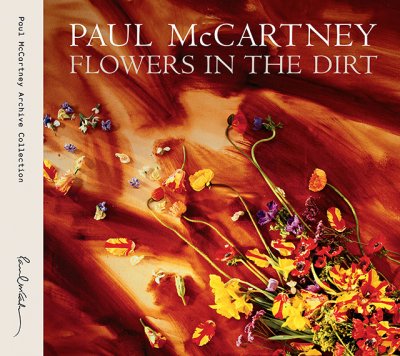 Ironically after this
return to the critical approval he so long sought, McCartney turned
his back on pop-rock and headed into the classical world (The
Liverpool Oratorio) before coming back four years later with Off the
Ground which included two of the co-writes with Costello, Mistress
and Maid and The Lovers That Never Were.
Ironically after this
return to the critical approval he so long sought, McCartney turned
his back on pop-rock and headed into the classical world (The
Liverpool Oratorio) before coming back four years later with Off the
Ground which included two of the co-writes with Costello, Mistress
and Maid and The Lovers That Never Were.
It was another competent McCartney album . . . but of more interest was the other album he released that same yea, it was the experimental Strawberries Oceans Ships Forest as The Fireman with producer Youth.
But that's yet another McCartney story . . .
There is a considerable amount about the many and various aspects of Paul McCartney's long career at Elsewhere, start here.

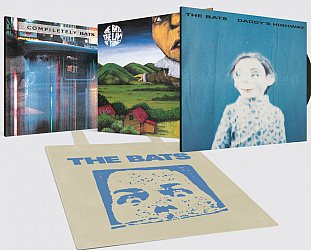
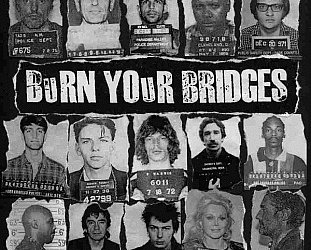
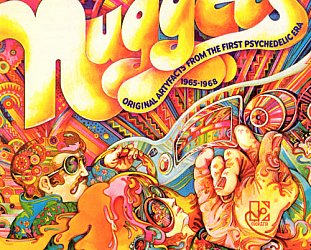
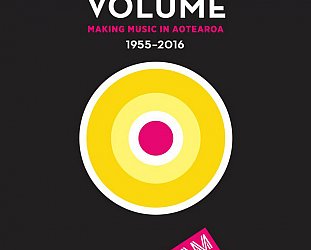


post a comment